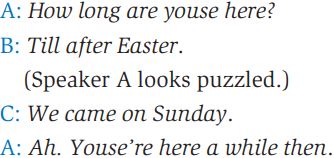

Grammar


Tenses


Present

Present Simple

Present Continuous

Present Perfect

Present Perfect Continuous


Past

Past Simple

Past Continuous

Past Perfect

Past Perfect Continuous


Future

Future Simple

Future Continuous

Future Perfect

Future Perfect Continuous


Parts Of Speech


Nouns

Countable and uncountable nouns

Verbal nouns

Singular and Plural nouns

Proper nouns

Nouns gender

Nouns definition

Concrete nouns

Abstract nouns

Common nouns

Collective nouns

Definition Of Nouns

Animate and Inanimate nouns

Nouns


Verbs

Stative and dynamic verbs

Finite and nonfinite verbs

To be verbs

Transitive and intransitive verbs

Auxiliary verbs

Modal verbs

Regular and irregular verbs

Action verbs

Verbs


Adverbs

Relative adverbs

Interrogative adverbs

Adverbs of time

Adverbs of place

Adverbs of reason

Adverbs of quantity

Adverbs of manner

Adverbs of frequency

Adverbs of affirmation

Adverbs


Adjectives

Quantitative adjective

Proper adjective

Possessive adjective

Numeral adjective

Interrogative adjective

Distributive adjective

Descriptive adjective

Demonstrative adjective


Pronouns

Subject pronoun

Relative pronoun

Reflexive pronoun

Reciprocal pronoun

Possessive pronoun

Personal pronoun

Interrogative pronoun

Indefinite pronoun

Emphatic pronoun

Distributive pronoun

Demonstrative pronoun

Pronouns


Pre Position


Preposition by function

Time preposition

Reason preposition

Possession preposition

Place preposition

Phrases preposition

Origin preposition

Measure preposition

Direction preposition

Contrast preposition

Agent preposition


Preposition by construction

Simple preposition

Phrase preposition

Double preposition

Compound preposition

prepositions


Conjunctions

Subordinating conjunction

Correlative conjunction

Coordinating conjunction

Conjunctive adverbs

conjunctions


Interjections

Express calling interjection

Phrases

Sentences


Grammar Rules

Passive and Active

Preference

Requests and offers

wishes

Be used to

Some and any

Could have done

Describing people

Giving advices

Possession

Comparative and superlative

Giving Reason

Making Suggestions

Apologizing

Forming questions

Since and for

Directions

Obligation

Adverbials

invitation

Articles

Imaginary condition

Zero conditional

First conditional

Second conditional

Third conditional

Reported speech

Demonstratives

Determiners


Linguistics

Phonetics

Phonology

Linguistics fields

Syntax

Morphology

Semantics

pragmatics

History

Writing

Grammar

Phonetics and Phonology

Semiotics


Reading Comprehension

Elementary

Intermediate

Advanced


Teaching Methods

Teaching Strategies

Assessment
Accent and dialect
المؤلف:
George Yule
المصدر:
The study of language
الجزء والصفحة:
240-18
7-3-2022
1431
Accent and dialect
Whether we think we speak a standard variety of English or not, we all speak with an accent. It is a myth that some speakers have accents while others do not. We might feel that some speakers have very distinct or easily recognized types of accent while others may have more subtle or less noticeable accents, but every language-user speaks with an accent. Technically, the term “accent” is restricted to the description of aspects of pronunciation that identify where an individual speaker is from, regionally or socially. It is different from the term dialect, which is used to describe features of grammar and vocabulary as well as aspects of pronunciation.
We recognize that the sentence You don’t know what you’re talking about will generally “look” the same whether spoken with an American accent or a Scottish accent. Both speakers will be using forms associated with Standard English, but have different pronunciations. However, this next sentence – Ye dinnae ken whit yer haverin’ aboot – has the same meaning as the first, but has been written out in an approximation of what a person who speaks one dialect of Scottish English might say. There are differences in pronunciation (e.g. whit, aboot), but there are also examples of different vocabulary (e.g. ken, haverin’) and a different grammatical form (dinnae).
While differences in vocabulary are often easily recognized, dialect variations in the meaning of grammatical constructions are less frequently documented. In the following example (from Trudgill, 1983) two British English speaking visitors (B and C) and a local Irish English speaker (A) are involved in a conversation in Donegal, Ireland.

It seems that the construction How long are youse here?, in speaker A’s dialect, is used with a meaning close to the structure “How long have you been here?” referring to past time. Speaker B, however, answers as if the question was referring to future time (“How long are you going to be here?”). When speaker C answers with a past time response (We came on Sunday), speaker A acknowledges it and repeats his use of a present tense (Youse’re here) to refer to past time. Note that the dialect form youse (= “you” plural) seems to be understood by the visitors though it is unlikely to be part of their own dialect.
 الاكثر قراءة في Linguistics fields
الاكثر قراءة في Linguistics fields
 اخر الاخبار
اخر الاخبار
اخبار العتبة العباسية المقدسة

الآخبار الصحية















 قسم الشؤون الفكرية يصدر كتاباً يوثق تاريخ السدانة في العتبة العباسية المقدسة
قسم الشؤون الفكرية يصدر كتاباً يوثق تاريخ السدانة في العتبة العباسية المقدسة "المهمة".. إصدار قصصي يوثّق القصص الفائزة في مسابقة فتوى الدفاع المقدسة للقصة القصيرة
"المهمة".. إصدار قصصي يوثّق القصص الفائزة في مسابقة فتوى الدفاع المقدسة للقصة القصيرة (نوافذ).. إصدار أدبي يوثق القصص الفائزة في مسابقة الإمام العسكري (عليه السلام)
(نوافذ).. إصدار أدبي يوثق القصص الفائزة في مسابقة الإمام العسكري (عليه السلام)


















